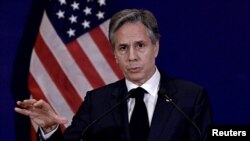Blinken will hold talks Wednesday and Thursday in Ethiopia's capital Addis Ababa with officials, civil society and humanitarian groups on the November 2 deal that halted the two-year war that has killed more people than Russia's invasion of Ukraine.
The United States has put the death toll at 500,000 while former Nigerian president Olusegun Obasanjo, who negotiated peace on behalf of the African Union, put it as high as 600,000, which would make the war one of the deadliest of the 21st century.
Blinken has alleged crimes against humanity in the course of the war, angering Prime Minister Abiy Ahmed's government, which has warned that a UN-backed probe into abuses would undermine the peace process.
Abiy won the Nobel Peace Prize for making peace with historic rival Eritrea and was once seen by the United States as part of a generation of dynamic new democratic leaders in Africa.
The war and allegations of abuses - including the withholding of food - have badly strained relations with the United States, which suspended Ethiopia's right to duty-free exports under a key trade pact, although Abiy participated in December in President Joe Biden's Africa summit in Washington.
Cameron Hudson, an Africa expert at the Center for Strategic and International Studies, said there was an active debate within the Biden administration on whether to patch up with Ethiopia, the continent's second most populous nation and home to the African Union, and those who believe that human rights concerns outweigh any geopolitical advantage.
"This is a bit of a fact-finding mission. There is this debate happening within the administration and I think Blinken needs to see for himself," Hudson said.
Hudson expected that Blinken would offer better ties as an incentive for moving forward on the peace process, including increasing humanitarian access in Tigray.
"What Addis is looking for is whether Washington is willing to say, enough has been done and we can normalize the bilateral relationship -- and that means turning on the financial spigot by restarting international lending assistance and assisting with the country's increasing debt crisis," Hudson said.
Abiy ordered the offensive after the TPLF, once Ethiopia's dominant power, attacked military installations.
A remaining sticking point is the role of Eritrea, whose authoritarian regime has tense ties with the TPLF and is accused of atrocities in Tigray.
US officials have hailed what they saw as Eritrean troop movements out of Tigray, but it is unclear to what extent the forces remain there.
On the second part of the secretary's Africa trip, Blinken will go to Niger to meet President Mohamed Bazoum as well as young people from conflict zones.
Ned Price, the spokesperson for the U.S State Department released a statement which read that the secretary of state will meet with Niger’s President Mohamed Bazoum and Foreign Minister Hassoumi Massaoudou on March 16.
“In the first ever visit to Niger by a U.S. Secretary of State, on March 16, Secretary Blinken will meet President Mohamed Bazoum and Foreign Minister Hassoumi Massaoudou in Niamey. He will discuss ways to advance the U.S.-Niger partnership on diplomacy, democracy, development, and defense,” read the statement.
“Secretary Blinken will also engage youths from Niger’s conflict zones, who have completed the Disarmament, Demobilization, Reintegration, and Reconciliation (DDRR) program, to learn about their contributions to peace in Niger,” added the statement.
Information from this report was sourced from Agence France-Presse.






